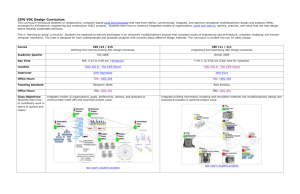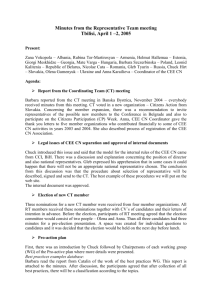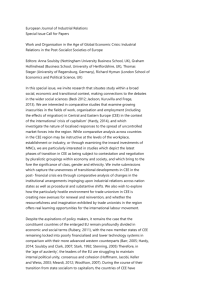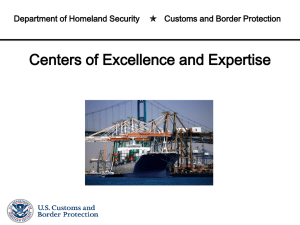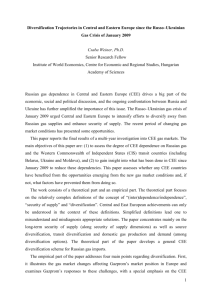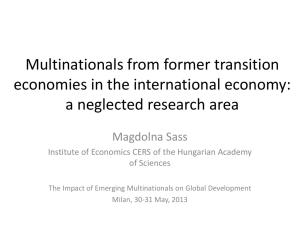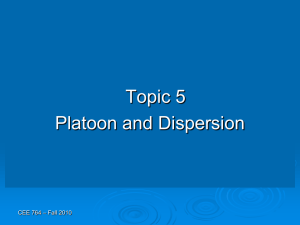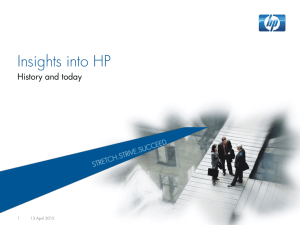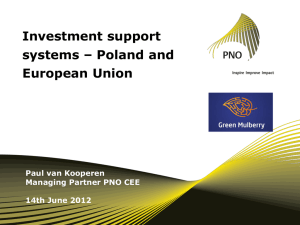The development of Shared Service Centers and Regional
advertisement
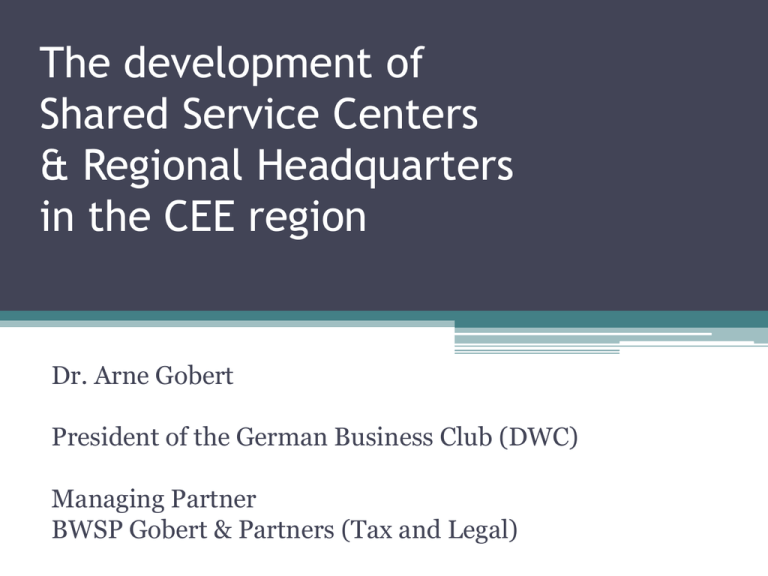
The development of Shared Service Centers & Regional Headquarters in the CEE region Dr. Arne Gobert President of the German Business Club (DWC) Managing Partner BWSP Gobert & Partners (Tax and Legal) Managing Partner - BWSP Gobert & Partners Current from 1996 President - Deutscher Wirtschafts Club (DWC) as the 4th President in the 20 years history of the club The DWC is a serious business platform available in Budapest for getting information about business, politics and other social and cultural events. The Club is active in the Hungarian-German Business community and plays an important role in the field of networking. German Business Club The Club has over 130 members, representing more than 110 companies The members are private individuals, whose professional activities are connected with German-Hungarian business relations. With a population of 135 million people Central and Eastern Europe is among the world’s most rapidly advancing economic regions The region is currently growing at a faster pace than Western European markets and therefore offers a bright future for foreign investors who are interested in regional opportunities and their unique benefits. Regional Headquarters Regional Headquarters Regional headquarters -Entity at the top of regional unit, including all activities of the various business units, to take full responsibility for overall profitability and success of this regional unit. CEE headquarters are typically located at 2nd or 3rd hierarchy level A CEE-HQ is an organizational unit that acts as an intermediary between global/European headquarters and country operations in CEE and is located in or next to the region. They are either: • Spin-off of an Austrian subsidiary, • Newly founded unit • Result of a takeover of firm with CEE presence Most CEE-HQs are still located in Vienna Regional Headquarters in Hungary • Hungary is still seen as an attractive option for locating regional headquarters. Budapest Headquarters Ageon Alcoa British Telecom Citigroup Flextronics • As the key attribute General Electric General Motors of that Huawei attractiveness, respondents named ING Group Knorr-Bremse highly qualified Lufthansa labor with strong Nokia language skills, Panasonic Corporation excellent infrastructure and Saab ‘Class A’ real estate. SIA Central Europe Volvo Industry Financial Services Industrial Metals & Mining Telecommunicatios Financial Services General Industrials General Industrials Automotive General Industrials Financial Services General Industrials Aviation Telecommunication Leisure Goods Automotive Financial Services Automotive Global HQ Netherlands USA UK USA Singapore USA USA China Netherlands Germany Germany Finnland Japan Sweden Italy Sweeden Headquarters in the CEE German Firms CEE Headquarters Company Name Allianz Bayer Beiersdorf DHL Heinrich Boell Foundation Henkel Knorr Bremese Lufthansa Robert Bosch AG RWE SAP Siemens Skoda (Volkswagen) Industry Insurance Pharma Cosmetics Industrial Transportation NGO FMCG General Industrials Aviation Electronics Oil & Gas Producers Software & IT General Industrials Automotive Regional Headquarter Location Vienna Warsaw Vienna Prague Warsaw Vienna Budapest Budapest Vienna Prague Bratislava Vienna Bratislava Shared Service Centers Shared Service Centers in Hungary Shared Service Centers - are entities formed for internal company purposes which are responsible for the migration and execution of specific non-core operational tasks that would otherwise be performed by the core businesses of the company. By centralizing in fewer locations companies can standardize and integrate processes allowing them to operate with greater efficiency, at a lower cost and with the flexibility to more easily respond to changes in demand. • • • • • • Growing into one of the country’s largest employers with 30,000 jobs. Approximately 100 SSCs in Hungary. Primary employ foreign language speaking, educated workforce. Leased office space reaches 200.000 sqm. 80% are currently in the expansion phase. Services include: ▫ ▫ ▫ ▫ ▫ ▫ ▫ Finance Accounting Procurement Logistics IT HR Transactional roles and complex, high-end, value-add activities. Regional shared service clusters have formed Selected shared service centeres in Hungary Criteria companies use when deciding in which country to locate an SSC 1.Workforce (availability, capability education, language skills, wage costs and labour productivity) 2.Infrastructure and premises (availability of office space, rental costs, reliable telecommunications networks, optical fibres) 3.Stability (political and economical, investment support) Number of centers in the CEE region / Employment from these centers Shared Service Centers in Germany Past Shared Service Center Trends Thank you for your attention Backup Slides CEE region attracts more SCC operations than Asia, North Africa, Western Europe and the Middle East • More than 20 percent of offshore projects by European firms have in recent years gone to the CEE region • “Hot Spots” are Bratislava, Brno, Budapest and Wroclaw, while Kosice, Bucharest, Hradec Kralove, Trenčín, Ostrava and Sofia The CEE offers many advantages, such as low wage costs for a talented labour force, as well as many foreign languages spoken, a business friendly environment and a good quality of life. Comparing Hungary to the CEE The methodology covers following fields: Starting a business, employing workers, paying taxes, enforcing contracts, protecting investors, closing business and trading across borders. Economic Stability in 2009 Challenges and Trends Challenges and Trends Source: Roland Berger GDP forecast based on purchasing power parity (PPP) per capita (EU-15 = 100) [%] CEE countries are vastly losing on competitiveness Only Poland is improving continuously The main advantage of CEE will still be its competitve labor costs Unit labor costs in % of EU-15, 2009 [%] Especially Slovakia, Poland and Hungary will remain attractive production locations. A growing and a shrinking Europe – Projected change: 2008-2030 Forecast: GDP vs. GDP per capita Future trend: CEE HQs move from Austria to CEE Nokia moves headquarters for its CEE region from Austria to Hungary. Nokia keeps its sales unit in Austria, with a strong local team that will continue to sell Nokia devices, offer Nokia services and ensure customer care for our products but the regional headquarters will be moved.
